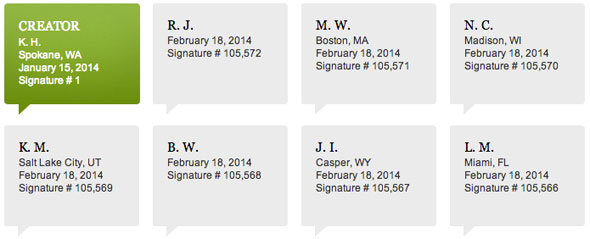"comcast" entries

Does net neutrality really matter?
Competition, access to bandwidth, and other issues muddy the net neutrality waters.

Screen shot of signatures from a “Common Carrier” petition to the White House.
It was the million comments filed at the FCC that dragged me out of the silence I’ve maintained for several years on the slippery controversy known as “network neutrality.” The issue even came up during President Obama’s address to the recent U.S.-Africa Business forum.
Most people who latch on to the term “network neutrality” (which was never favored by the experts I’ve worked with over the years to promote competitive Internet service) don’t know the history that brought the Internet to its current state. Without this background, proposed policy changes will be ineffective. So, I’ll try to fill in some pieces that help explain the complex cans of worms opened by the idea of network neutrality.
Read more…

Court prods FCC in unexpected direction in this week’s Verizon ruling
Network neutrality was on the retreat shortly after the Telecom Act of 1996.
A court ruling this past Tuesday on FCC “network neutrality” regulation closes and opens a few paths in a three-way chess game that has been going on for years between the US District Court of Appeals, the FCC, and the major Internet server providers. (Four-way if you include Congress, and five-way if you include big Internet users such as Google — so, our chess game is coming closer to Chinese Checkers at this point.)
A lot of bloggers, and even news headlines, careened into histrionics (“Net neutrality is dead. Bow to Comcast and Verizon, your overlords“). The Free Press, although oversimplifying the impact, did correctly link the ruling to what they and many other network neutrality supporters consider the original sin of FCC rulings: eviscerating the common carrier regulation of broadband providers.
Even better, many commenters noted the ambiguities and double messages in the ruling. Unlike a famous earlier ruling on Comcast regulation, this week’s court ruling spends a good deal of time affirming the FCC’s right to regulate Internet providers. Notably, pp. 35-36 essentially confirm the value and validity of network neutrality (in the form of promoting innovation at the edges by placing no restraints on transmissions).
Read more…

DC Circuit court rules in Comcast case, leaves the FCC a job to do
The DC Circuit didn't tell the FCC to turn back. It has a job to
do–promoting the spread of high-speed networking, and ensuring that
it is affordable by growing numbers of people–and it just has to find
the right tool for the job.

Comcast Pays $125 Million for Lifestyle Web Publisher DailyCandy
Comcast is buying shopping/lifestyle Web publisher DailyCandy for $125 million. From the New York Times: … the company, driven by a small army of contributors providing breezy tips, has grown to encompass 13 daily and 8 weekly newsletters, reaching 2.5 million subscribers in 11 American cities and London. As the Times notes, DailyCandy is one of a number of…

Network neutrality: code words and conniving at yesterday's FCC hearing (Part 2 of 2)
Yesterday I
summarized the public FCC hearing
about bandwidth at the Harvard Law School, and referred readers to a
more comprehensive background article.
In this article I’ll highlight some of the rhetoric at the meeting,
which shows that network providers’ traffic shaping is no more
sophisticated or devious than the shaping of public perceptions by
policy-makers and advocates.

Network neutrality: how the FCC sees it (Part 1 of 2)
The mere announcement of an FCC hearing on “broadband network
management practices” was a notch in the gun of network neutrality
advocates. Yet to a large extent, the panelists and speakers were like
petitioners who are denied access to the king and can only bring their
complaints to the gardeners who decorate the paths outside his gate. I
wrote a major
analysis two years ago
that I really think still stands as an accurate representation of the
issues. What we’ll end up getting is a formal endorsement of
non-discrimination as a policy that Internet providers must follow,
leading to continual FCC review of current practices by telecom and
cable companies.